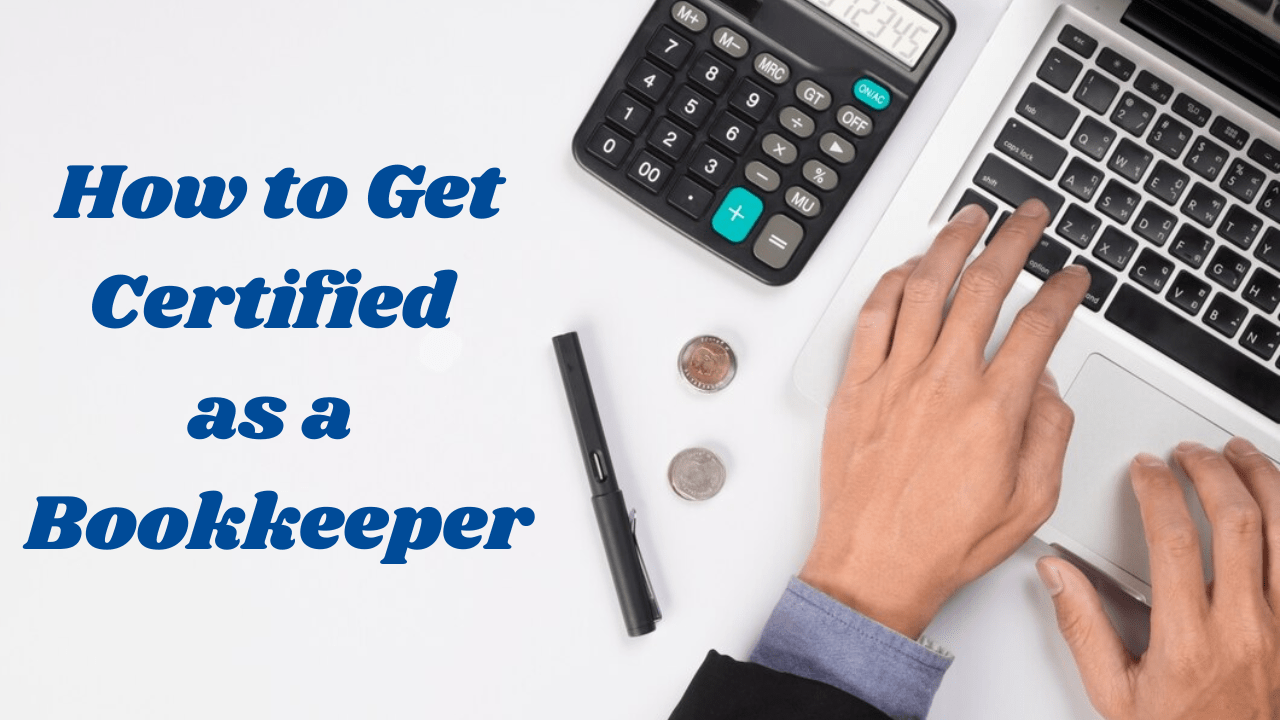
Bookkeepers are essential to businesses of all sizes, ensuring financial accuracy and compliance. They handle everything from cash flow management to payroll and tax preparation. In fact, the U.S. Bureau of Labor Statistics reported over 1.7 million bookkeeping jobs in 2022, with steady demand ahead.
What makes bookkeeping such an attractive career? It offers job stability, opportunities for advancement, and the chance to work across industries—from healthcare to retail to tech.
With the rise of remote work, you can even build a career from the comfort of your home. Ready to learn how to become a bookkeeper and step into this in-demand profession? Let’s get started.
What is a Bookkeeper?
Ever wondered who ensures every dollar in a business is tracked, recorded, and accounted for?
A bookkeeper is the financial gatekeeper of any business, managing invoices, payments, and bank reconciliations to keep the financial engine running smoothly.
Why does this matter? Warren Buffett once said, “Accounting is the language of business.” Accurate bookkeeping translates that language into actionable insights, helping businesses thrive.
Mistakes in financial records can lead to cash flow problems, tax penalties, or even business failure. A skilled bookkeeper ensures transparency, compliance, and a clear path to growth.
What Does a Bookkeeper Do?
A bookkeeper is the financial backbone of any business, ensuring accuracy and compliance while keeping operations running smoothly. But what exactly does their day-to-day work look like, and how do they make such a big impact? Let’s break it down:
| Responsibility | What It Entails | Why It’s Essential |
| Cash Flow Management | Overseeing money coming in and going out to ensure liquidity. | Prevents cash shortages and keeps the business operational. |
| Financial Recordkeeping | Documenting every transaction, from sales to expenses, in organized ledgers. | Provides a clear audit trail and ensures transparency for stakeholders. |
| Payroll Oversight | Managing employee payments, tax withholdings, and benefits deductions. | Builds trust with employees and avoids legal complications. |
| Tax Preparation Support | Gathering and organizing financial data for accurate tax filings. | Reduces errors and minimizes the risk of audits or penalties. |
| Error Detection | Reconciling accounts and identifying discrepancies before they become problems. | Protects the business from costly mistakes and maintains financial integrity. |
| Budget Monitoring | Tracking spending patterns and flagging areas where costs can be reduced. | Helps businesses stay within budget and achieve long-term financial goals. |
Bookkeepers are critical across industries—whether it’s retail, healthcare, real estate, or freelancing platforms, their expertise keeps businesses on track. As financial expert Dave Ramsey once said, “You must gain control over your money, or the lack of it will forever control you.” Bookkeepers empower businesses to take control.
What Qualifications Do I Need to Be a Bookkeeper?
Breaking into bookkeeping doesn’t mean spending years in school or taking on massive student debt. Instead, it’s about combining the right mix of education, skills, and mindset. If you’re wondering how long does it takes to become a bookkeeper, it depends on your path.
Affordable courses in accounting or QuickBooks can take weeks or months, while certifications like Certified Bookkeeper (CB) typically require 1-3 months. An associate degree takes about two years but isn’t mandatory—many succeed with just certifications.
For those interested in expanding their expertise beyond bookkeeping, exploring programs like Business Accounting can provide deeper insights into financial management and open even more career opportunities. Learn more about business accounting.
This flexible timeline lets you start your career quickly, even without prior experience.
Education That Works for You:
At a minimum, a high school diploma or equivalent is required. But if you want to stand out, consider taking affordable courses in accounting, finance, or even software like QuickBooks. Some aspiring bookkeepers opt for an associate degree in accounting, but it’s not mandatory—many succeed with certifications alone.
Skills That Make or Break the Job:
- Attention to Detail: A single missed transaction can lead to major headaches. Precision isn’t just a skill—it’s a necessity.
- Organizational Prowess: Managing invoices, payroll, and reports means juggling multiple tasks at once. Staying organized keeps stress low and efficiency high.
- Math and Data Entry Mastery: Speed and accuracy matter when handling numbers daily. If spreadsheets intimidate you, don’t worry—practice makes perfect.
Why Ongoing Learning Pays Off:
The world of bookkeeping is always evolving, especially with new tools and technologies reshaping the industry. Staying updated with trends and mastering software like Xero or FreshBooks can set you apart.
Certifications, like becoming a Certified Bookkeeper (CB) or earning QuickBooks certification, boost your credibility and open doors to higher-paying opportunities.
Here’s the good news: You don’t need to be a math genius or have years of experience to get started. With the right training and determination, anyone can step into this rewarding field.
The real question is—what steps will you take to prepare?
How to Get Certified as a Bookkeeper
Certifications are the secret weapon that can elevate your bookkeeping career, boost your credibility, and open doors to better opportunities. But how do you get certified, and how long does it take to become a bookkeeper—especially if you aim to work from home as a virtual bookkeeper? Let’s break it down:
Why Certification Matters
Employers and clients trust certified bookkeepers because they bring proven expertise to the table.
According to the U.S. Bureau of Labor Statistics, bookkeepers with specialized skills, like proficiency in accounting software, often have better job prospects. QuickBooks certification, for example, is especially valuable for virtual roles, as businesses rely heavily on this software.
Popular Certifications
Certifications | What It Covers | Best For |
Certified Bookkeeper (CB)
| Advanced bookkeeping, payroll, financial reporting, and compliance. | Traditional bookkeeping roles. |
QuickBooks Certification | Mastery of QuickBooks for invoicing, reporting, and tax prep. | Virtual bookkeepers and freelancers. |
Time Commitment
Most certifications take 1-3 months to complete, depending on your schedule and experience. With structured training programs and expert guidance, you can stay on track and complete your certification efficiently.
Value in the Job Market
Certified bookkeepers have a significant edge in today’s competitive job market. Here’s why:
- Higher Earning Potential: Employers are willing to pay more for certified professionals who demonstrate expertise and reliability.
- Increased Demand: Specialized skills, like QuickBooks proficiency, are highly sought after, especially for remote roles.
- Better Opportunities: Certifications open doors to higher-paying positions and freelance gigs with premium rates.
- Remote Work Edge: Virtual bookkeepers with certifications often stand out to businesses looking for skilled, tech-savvy professionals.
If you’re ready to take your career to the next level, certification is the way to go.
Beyond Certification
- Gain hands-on experience through internships or freelance gigs.
- Join professional organizations for networking and industry insights.
- Learn complementary skills like Excel or tax prep to stand out even more.
Certifications are your stepping stone to success. Ready to get started?
What Are the Steps to Becoming a Bookkeeper?
Becoming a bookkeeper is a step-by-step process that combines education, practical experience, and skill-building. Here’s how you can get started:
1. Complete Your High School Education
Focus on subjects like math, accounting, and business to build a strong foundation. These basics will prepare you for the financial tasks ahead.
2. Pursue an Associate Degree in Accounting or Finance (Optional)
While not mandatory, an associate degree can give you deeper knowledge and make you stand out to employers. It’s a great option if you want to dive deeper into the field.
3. Gain Practical Experience Through Internships or Entry-Level Roles
Hands-on experience is key. Look for internships, part-time roles, or freelance gigs to apply your skills and learn the ropes of real-world bookkeeping.
4. Earn Relevant Bookkeeping Certifications
Certifications like Certified Bookkeeper (CB) or QuickBooks Certification boost your credibility and employability. They show employers you’re committed to excellence.
5. Develop Proficiency in Accounting Software
Master tools like QuickBooks, Xero, or FreshBooks. These platforms are essential for modern bookkeepers and can significantly improve your efficiency.
6. Enhance Your Understanding of Financial Regulations
Stay updated on tax laws, compliance rules, and bookkeeping standards. This ensures accuracy and keeps businesses legally compliant.
7. Strengthen Your Analytical and Detail-Oriented Skills
Bookkeeping requires precision. Sharpen your ability to spot errors, track discrepancies, and maintain accurate financial records.
8. Build Strong Organizational Skills
Stay on top of multiple tasks by creating efficient filing systems and managing documentation. Organization is crucial for handling accounts, invoices, and reports.
9. Learn to Communicate Financial Information Clearly
Develop the ability to explain complex financial data to clients, managers, or auditors. Clear communication builds trust and ensures everyone is on the same page.
10. Start Applying for Bookkeeping Jobs
Once you’ve built your skills and credentials, start applying for entry-level positions. Freelance or part-time opportunities are also great ways to gain experience while growing your career.
With these steps, you’ll be well on your way to launching a successful bookkeeping career. Ready to take action?
Should I Become a Bookkeeper?
Wondering if bookkeeping is the right career for you, especially if you’re considering how to become a bookkeeper at home?
Like any profession, it has its upsides and a few considerations to keep in mind. Let’s explore both to help you determine if this path aligns with your goals and personality.
Pros of Becoming a Bookkeeper
- Job Stability: Businesses of all sizes need bookkeepers, making it a reliable career choice. The demand isn’t going away anytime soon.
- Flexibility: Many bookkeepers work remotely or freelance, offering the freedom to create your own schedule.
- Career Growth: With experience and certifications, you can move into roles like accounting, financial analysis, or even start your own bookkeeping business.
- Low Barrier to Entry: You don’t need a four-year degree to get started—certifications and practical skills can take you far.
Cons of Becoming a Bookkeeper
Bookkeeping has its challenges, but they’re manageable with the right approach:
- Attention to Detail: Precision is key, but it’s a skill you’ll master over time.
- Repetitive Tasks: Some tasks may feel routine, but they help you build efficiency and expertise.
- Structured Work: The focus on rules and numbers might feel limiting, but it also brings clarity and a sense of accomplishment.
Is Bookkeeping Right for You?
Ask yourself these questions:
- Do you enjoy working with numbers and organizing data?
- Are you detail-oriented and comfortable with repetitive tasks?
- Do you value stability and flexibility in your career?
If you answered yes, bookkeeping could be a great fit. But if you crave variety or creativity, you might want to explore related fields like marketing or project management instead.
Take a moment to reflect on your strengths and interests. Does bookkeeping align with your personal goals? The answer will guide you toward a fulfilling career path.
Exploring Opportunities in Bookkeeping
Landing a bookkeeping job requires strategy and preparation. Here’s how to make it happen:
Where to Look
- Online Job Boards: Search platforms like Indeed, LinkedIn, and Glassdoor for openings.
- Local Businesses: Reach out directly to small businesses that may need your skills.
- Staffing Agencies: Temporary roles can lead to full-time opportunities.
Networking Matters
- Attend industry events or webinars to connect with professionals.
- Join online forums on LinkedIn or Facebook to find advice and leads.
- Build relationships with local business owners or accountants.
Freelancing Options
Explore platforms like Upwork, Fiverr, or Belay for remote gigs. Freelancing lets you gain experience and build a portfolio on your terms.
Stand Out with Your Resume
Highlight key skills like QuickBooks proficiency and attention to detail. Tailor your resume and cover letter for each job to show you’re the right fit.
Ace the Interview
Prepare for common questions like:
- “How do you ensure accuracy?”
- “What’s your process for reconciling accounts?”
- Confidence and preparation will set you apart.
With persistence and the right approach, you’ll find the perfect bookkeeping opportunity—whether it’s full-time, part-time, or freelance.
Conclusion
Becoming a bookkeeper is a clear and achievable path that combines education, certifications, and hands-on experience. From completing your high school education to earning certifications like Certified Bookkeeper (CB) or QuickBooks Certification, each step builds your skills and credibility. With job stability, flexibility, and opportunities for growth, bookkeeping can be a rewarding career choice.
Ready to take the next step? Enroll in training programs like those offered by CCI Training Center to gain the knowledge and qualifications you need to succeed.
Explore available resources, sign up for a certification course, and start building your future today. Your journey to becoming a successful bookkeeper begins with one decision—make it now!
Program Offered
- Pharmacy Technician Training
- Online Medical Assistant
- Medical Billing and Coding Specialist Program
- Cloud Computing Technician Training
- Computer Network Technician
- Business and Accounting
- Radiology Technician Training
- Medical Assistant Program
- Computer Support Technician
- Cybersecurity Program
- Virtual Assistant Training

This article is written by
Share this article
Program Offered
- Pharmacy Technician Training
- Online Medical Assistant
- Medical Billing and Coding Specialist Program
- Cloud Computing Technician Training
- Computer Network Technician
- Business and Accounting
- Radiology Technician Training
- Medical Assistant Program
- Computer Support Technician
- Cybersecurity Program
- Virtual Assistant Training

This article is written by
Share this article
Related Articles




CCI Training Center Proudly Completes
41 Years in Career Training Services















